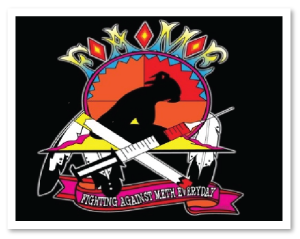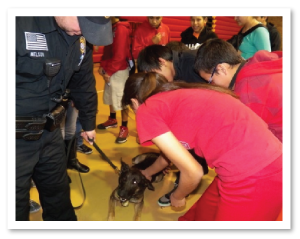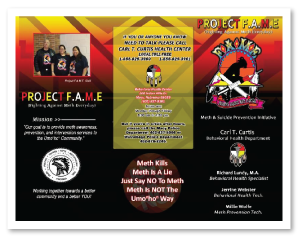


Project F.A.M.E. (Fighting Against Meth Everyday) is an program that has been designed by the behavioral health team at the Carl T. Curtis Health Education Center of the Omaha Tribe of Nebraska to address the rising issue of methamphetamine use. During the fifth year of the Methamphetamine and Suicide Prevention Initiative (MSPI) funding, Carl T. Curtis decided to use their resources in a new way to address an issue in their community that had formally not seen as much attention as they deemed necessary -community-based outreach and education for methamphetamine use and, most importantly, aftercare services.
Project F.A.M.E. was launched in September 2013 after a community assessment by Carl T. Curtis. The assessment revealed an increase prevalence of methamphetamine within the community. In addition, the community assessment indicated that the use of methamphetamine had not only grown among the adult population, but the effects were entering the lives of many children. With this in mind, the Behavioral Health Department Guidance and Development center put plans in action to heal the community as a whole. Project F.A.M.E. approaches the issue in two phases: educating the community on the realities of methamphetamine addiction; and providing intensive outpatient program services to support people returning home from a treatment facility.
As a new program, Project F.A.M.E. has been remarkably successful in engaging the community, especially the youth. The Meth Awareness Assembly hosted by Project F.A.M.E. is a prime example of an activity that captured the attention of many local junior high and high school students. The assembly included cultural presentations, participation of the Drug Enforcement Agency (DEA), an appearance from the Omaha National Law Enforcement K-9 unit (who brought two police dogs in to meet the students), and a comedian who shared his experiences as a recovering meth addict through a humorous message that resonated with the youth. The outreach and education portion of Project F.A.M.E.'s programing most directly focuses on youth, leading the community in various events including cultural activities such as hand games, gourd dances, couples events and a variety of others. The project team continues to collect evaluations, assess activities and research promising practices in order to provide a variety of services and activities that are meaningful, effective and reach community members from all angles.
Project F.A.M.E. has designed their programming to engage a variety of resources throughout the community. This model of community collaboration is also key in Project F.A.M.E.'s approach to assuring greater access to treatment for those suffering from addiction to methamphetamine. One mission of this project is to seek out key stakeholders and Tribal entities to provide and support youth and adult referrals for treatment. These partners include, but are not limited to Tribal courts, law enforcement, Umonhon Nation public school, child protection services, Omaha Tribal Ambulance Department, and alcohol programs. By mapping out this model, Project F.A.M.E. is not only improving the efficiency of their programing, but is also building a sustainability framework for this project. Project F.A.M.E. also shared that within this model, it is important to gain buy-in from the Tribal Council and support from Elders.
Two key collaborators in the project's efforts have been the Behavioral Health Specialists, Inc. resident treatment center in Norfolk, Nebraska, and the Umonhon Alcohol Program halfway house. Project F.A.M.E. works closes with both the residential treatment center and the halfway house to complete chemical dependency evaluations before community members enter treatment, exit interviews once clients leave treatment, and to develop Individual Case Plans (ICP) to plan for longer-term aftercare. Within the structure of an aftercare plan, many of the community partners mentioned above are once again engaged in the process.
In structuring this aftercare program, Project F.A.M.E. has implemented the evidence-based Matrix Model for Meth Treatment. What was originally a yearlong program, Project F.A.M.E. adapted to reflect 16 weeks of structured intensive outpatient care and programing and an additional 16 weeks of continued care with patients and their families.
The structure of the project relies on key staff of the F.A.M.E. team, including a Behavioral Health Specialist, the Behavioral Health Tech, and the Meth Prevention Tech, who all work together to provide the wide array of prevention and therapeutic services. While the Behavioral Health Specialist focuses on the edufcational and therapeutic components of the aftercare program, the Meth Prevention Tech is integral in reaching out to build awareness in the community as well as connections with the community partners key to their project. Together the team works together to form a smooth running operation.
So far, Project F.A.M.E. is seeing an increasing interest in their aftercare services and has successfully cared for a number of individuals. Project F.A.M.E. shared that while many men in the community have been identified as potential clients, and that youth are a target population of this programing, the strong majority of participants have been women. As a new project, the team is looking toward engaging and healing more of the community as whole.
For more information about the White Sky Hope Center and their MSPI activities, contact Mike Geboe at [email protected] or for information about KHEW PSA project contact Jonathan Eagleman at [email protected].
National Indian Health Board
50 F St NW, Suite 600 | Washington, DC 20001 | Phone: 202-507-4070 | Email: [email protected]
